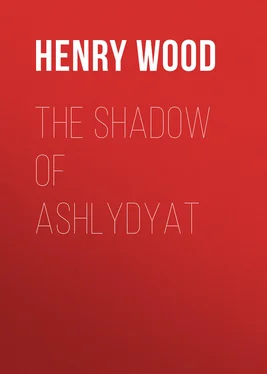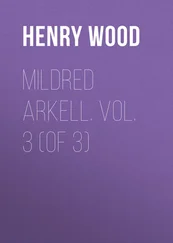Henry Wood - The Shadow of Ashlydyat
Здесь есть возможность читать онлайн «Henry Wood - The Shadow of Ashlydyat» — ознакомительный отрывок электронной книги совершенно бесплатно, а после прочтения отрывка купить полную версию. В некоторых случаях можно слушать аудио, скачать через торрент в формате fb2 и присутствует краткое содержание. Жанр: foreign_prose, literature_19, foreign_antique, на английском языке. Описание произведения, (предисловие) а так же отзывы посетителей доступны на портале библиотеки ЛибКат.
- Название:The Shadow of Ashlydyat
- Автор:
- Жанр:
- Год:неизвестен
- ISBN:нет данных
- Рейтинг книги:4 / 5. Голосов: 1
-
Избранное:Добавить в избранное
- Отзывы:
-
Ваша оценка:
- 80
- 1
- 2
- 3
- 4
- 5
The Shadow of Ashlydyat: краткое содержание, описание и аннотация
Предлагаем к чтению аннотацию, описание, краткое содержание или предисловие (зависит от того, что написал сам автор книги «The Shadow of Ashlydyat»). Если вы не нашли необходимую информацию о книге — напишите в комментариях, мы постараемся отыскать её.
The Shadow of Ashlydyat — читать онлайн ознакомительный отрывок
Ниже представлен текст книги, разбитый по страницам. Система сохранения места последней прочитанной страницы, позволяет с удобством читать онлайн бесплатно книгу «The Shadow of Ashlydyat», без необходимости каждый раз заново искать на чём Вы остановились. Поставьте закладку, и сможете в любой момент перейти на страницу, на которой закончили чтение.
Интервал:
Закладка:
Strange to say, the appellation of this waste piece of land, with its wild bushes, was the “Dark Plain.” Why? The plain was not dark: it was not shaded: it stood out, broad and open, in the full glare of sunlight. That certain dark tales had been handed down with the appellation, is true: and these may have given rise to the name. Immediately before the archway, for some considerable, space, the ground was entirely bare. Not a blade of grass, not a shrub grew on it. Or, as the story went, would grow. It was on this spot that the appearance, the Shadow, as mentioned by Charlotte Pain, would be sometimes seen. Whence the Shadow came, whether it was ghostly or earthly, whether those learned in science and philosophy could account for it by Nature’s laws, whether it was cast by any gaseous vapour arising in the moonbeams, I am unable to say. If you ask me to explain it, I cannot. If you ask, why then do I write about it, I can only answer, because I have seen it. I have seen it with my own unprejudiced eyes; I have sat and watched it, in its strange stillness; I have looked about and around it, low down, high up, for some substance, ever so infinitesimal, that might cast its shade and enable me to account for it: and I have looked in vain. Had the moon been behind the archway, instead of behind me , that might have furnished a loophole of explanation: a very poor and inefficient loophole; a curious one also: for how can an archway in the substance be a bier and two mourners in its shadow? but, still, better than none.
No; there was nothing whatever, so far as human eyes—and I can tell you that keen ones and sceptical ones have looked at it—to cast the shade, or to account for it. There, as you sat and watched, stretched out the plain in the moonlight, with its low, tomb-like bushes, its clear space of bare land, the archway rising behind it. But, on the spot of bare land, before the archway, would rise the Shadow; not looking as if it were a shadow cast on the ground, but a palpable fact: as if a bier, with its two bending mourners, actually stood there in the substance. I say that I cannot explain it, or attempt to explain it; but I do say that there it was to be seen. Not often: sometimes not for years together. It was called the Shadow of Ashlydyat: and superstition told that its appearance foreshadowed the approach of calamity, whether of death or other evil, to the Godolphins. The greater the evil that was coming upon them, the plainer and more distinct would be the appearance of the Shadow—the longer the space of time that it would be observed. Rumour went, that once, on the approach of some terrible misfortune, it had been seen for months and months before, whenever the moon was sufficiently bright. The Godolphins did not care to have the subject mentioned to them: in their scepticism, they (some of them, at least) treated it with ridicule, or else with silence. But, like disbelievers of a different sort, the scepticism was more in profession than in heart. The Godolphins, in their inmost soul, would cower at the appearance of that shadowed bier; as those others have been known to cower, in their anguish, at the approach of the shadow of death.
This was not all the superstition attaching to Ashlydyat: but you will probably deem this quite enough for the present. And we have to return to Mrs. Godolphin.
Five years before the present time, when pretty Cecilia was in her fifteenth year, and most needed the guidance of a mother, Mrs. Godolphin died. Her illness had been of a lingering nature; little hope in it, from the first. It was towards the latter period of her illness that what had been regarded by four-fifths of Prior’s Ash as an absurd child’s tale, a superstition unworthy the notice of the present-day men and women, grew to be talked of in whispers, as something “strange.” For three months antecedent to the death of Mrs. Godolphin, the Shadow of Ashlydyat was to be seen every light night, and all Prior’s Ash flocked up to look at it. That they went, is of no consequence: they had their walk and their gaze for their pains: but that Mrs. Godolphin should have been told of it, was. She was in the grounds alone one balmy moonlight night, later than she ought to have been, and she discerned people walking in them, making for the ash-trees.
“What can those people be doing here?” she exclaimed to one of her servants, who was returning to Ashlydyat from executing an errand in the town.
“It is to see the Shadow, ma’am,” whispered the girl, in answer, with more direct truth than prudence.
Mrs. Godolphin paused. “The Shadow !” she uttered. “Is the Shadow to be seen?”
“It has been there ever since last moon, ma’am. It never was so plain, they say.”
Mrs. Godolphin waited her opportunity, and, when the intruders had dispersed, proceeded to the ash-trees. It is as well to observe that these ash-trees, and also the Dark Plain, though very near to the house, were not in the more private portion of the grounds.
Mrs. Godolphin proceeded to the ash-trees. An hour afterwards, her absence from the house was discovered, and they went out to search. It was her husband who found her. She pointed to the shadow, and spoke.
“You will believe that my death is coming on quickly now, George.” But Mr. Godolphin turned it off with an attempt at joke, and told her she was old enough to know better.
Mrs. Godolphin died. Two years after, Mr. Godolphin came into contact with a wealthy young widow; young, as compared with himself: Mrs. Campbell. He met her in Scotland, at the residence of his first wife’s friends. She was English born, but her husband had been Scotch. Mr. Godolphin married her, and brought her to Ashlydyat. The step did not give pleasure to his children. When sons and daughters are of the age that the Godolphins were, a new wife, brought home to rule, rarely does give pleasure to the first family. Things did not go on very comfortably: there were faults on each side; on that of Mrs. Godolphin, and on that of her step-daughters. After a while, a change was made. Thomas Godolphin and his sisters went to reside in the house attached to the bank, a handsome modern residence hitherto occupied by Mr. Crosse. “You had better come here,” that gentleman had said to them: he was no stranger to the unpleasantness at Ashlydyat. “I will take up my abode in the country,” he continued. “I would prefer to do so. I am getting to feel older than I did twenty years ago, and country air may renovate me.”
The arrangement was carried out. Thomas Godolphin and his three sisters entered upon their residence in Prior’s Ash, Janet acting as mistress of the house, and as chaperon to her sisters. She was then past thirty: a sad, thoughtful woman, who lived much in the inward life.
Just about the time of this change, certain doings of local and public importance were enacted in the neighbourhood, in which Mr. Godolphin took a prominent share. There ensued a proposal to knight him. He started from it with aversion. His family started also: they and he alike despised these mushroom honours. Not so Mrs. Godolphin. From the moment that the first word of the suggestion was breathed to her, she determined that it should be carried out; for the appellation, my lady, was as incense in her ears. In vain Mr. Godolphin strove to argue with her: her influence was in the ascendant, and he lay under the spell. At length he yielded; and, though hot war raged in his heart, he bent his haughty knee at the court of St. James’s, and rose, up Sir George.
“After a storm comes a calm.” A proverb pleasant to remember in some of the sharp storms of life. Mrs. Godolphin had carried her point in being too many for her step-daughters; she had triumphed over opposition and become my lady; and now she settled down in calmness at Ashlydyat. But she grew dissatisfied. She was a woman who had no resources within herself, who lived only in excitement, and Ashlydyat’s quietness overwhelmed her with ennui. She did not join in the love of the Godolphins for Ashlydyat. Mr. Godolphin, ere he had brought her home to it, a bride, had spoken so warmly of the place, in his attachment to it, that she had believed she was about to step into some modern paradise: instead of which, she found, as she expressed it, a “cranky old house, full of nothing but passages.” The dislike she formed for it in that early moment never was overcome.
Читать дальшеИнтервал:
Закладка:
Похожие книги на «The Shadow of Ashlydyat»
Представляем Вашему вниманию похожие книги на «The Shadow of Ashlydyat» списком для выбора. Мы отобрали схожую по названию и смыслу литературу в надежде предоставить читателям больше вариантов отыскать новые, интересные, ещё непрочитанные произведения.
Обсуждение, отзывы о книге «The Shadow of Ashlydyat» и просто собственные мнения читателей. Оставьте ваши комментарии, напишите, что Вы думаете о произведении, его смысле или главных героях. Укажите что конкретно понравилось, а что нет, и почему Вы так считаете.












